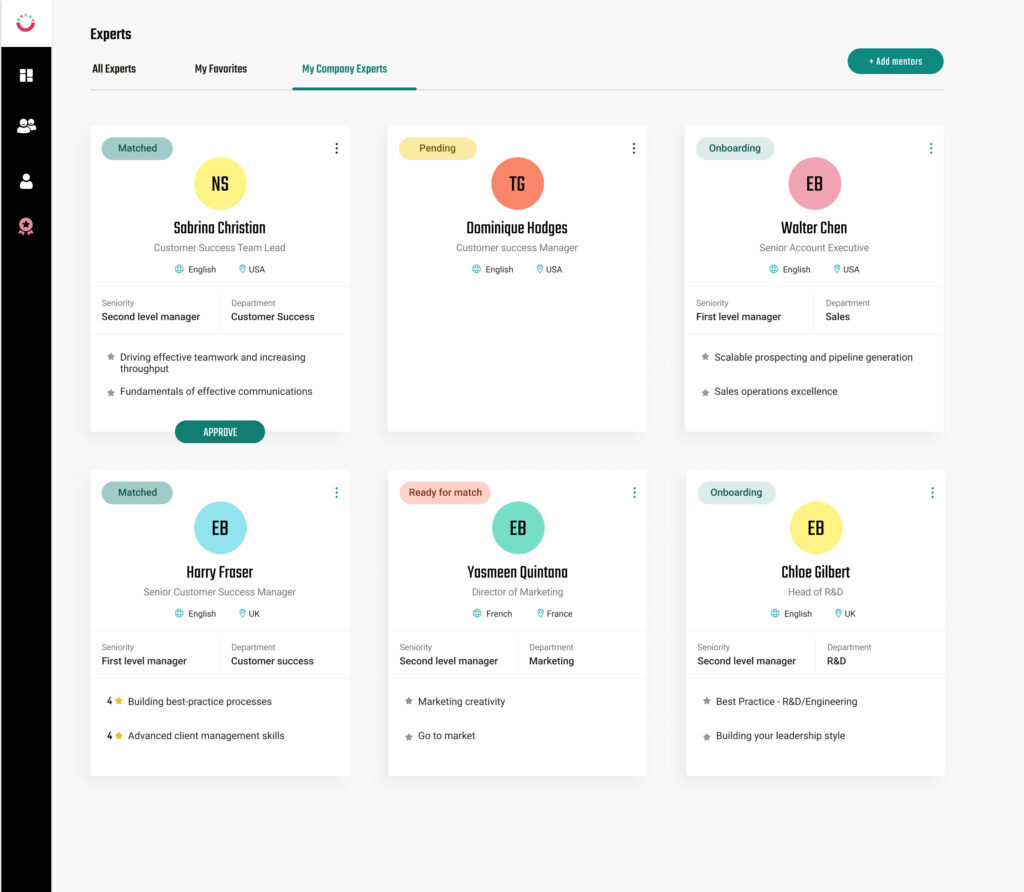The world around us is evolving at a rapid pace, forcing companies to constantly adapt to ever-changing technologies and client needs. However, companies often overlook the impact this may have on their employees; as the goals of a company change, so do the responsibilities of its employees, and as industries evolve, so do the career goals of those who work in them. In fact, according to Accenture, 41% of employees state lack of career development and advancement as the main driver for leaving a job, and yet, only 29% of organizations have a clear L&D plan. Meanwhile, research reveals a direct positive correlation between successful mentoring and employee retention, work and career satisfaction, and promotability.
An internal mentoring program allows companies to harness internal resources to help employees grow together in accordance with organizational knowledge and culture and prepare wisely for the future. Especially during periods of economic uncertainty, companies need to be able to optimize resources and do more with less. By leveraging internal resources to coach and mentor talent, internal mentoring helps companies continue to invest in talent development without seeking and paying for external professionals.
Businesses utilize homegrown experts to provide employees with the targeted skill development they need to succeed in their current roles, advance toward their future positions, and execute business goals more efficiently. Internal mentoring also nurtures an internal culture of “paying it forward” that allows organizations to reskill, upskill, and master succession planning based on internal talent.
Enable your organization, mentors, and mentees to achieve their goals
Internal mentoring is a career-focused relationship in which an experienced employee provides guidance and advice to a younger or less experienced colleague. The central goal is to guide the development of knowledge, skills, and behaviors the mentee can use to further their success within the company within a trusting and supportive environment.
When done right, an internal mentoring program benefits the organization as a whole, as well as both the mentors and mentees. It promotes a strong workplace culture of learning, provides talent with the support they need to build successful careers within the company, and drives forward the achievement of the company’s goals. Meanwhile, mentors have the opportunity to develop leadership, interpersonal, and communication skills, and mentees accelerate their professional growth, develop new skills and knowledge in their domain, and gain valuable career guidance.
Informal mentoring programs often lack clear goals, structure, tools, and management. In a formal mentoring program, the organization defines specific objectives for the program, along with KPIs to measure success and track progress. There is a qualified individual or team who is responsible for matching up mentees and mentors, laying out the guidelines for communication, setting explicit timelines, and monitoring progress. Formal mentoring programs ensure a strong framework of support for participants, while encouraging commitment and accountability from everyone involved.
GrowthSpace facilitates successful internal mentoring
GrowthSpace tags mentors according to an elaborate skills taxonomy and then automatically creates the ideal mentor-mentee matches based on the goals of the mentee and the specific expertise of the mentor.
Thanks to the intuitive GrowthSpace platform, companies can smoothly onboard mentors and mentees, track their progress, and measure success throughout the program. GrowthSpace also integrates with HRIS software and other tools, allowing for streamlined processes and communication. Users can connect to their existing calendars, communicate via a video conferencing tool, and easily record their progress.

Throughout the program, GrowthSpace provides HR personnel, mentors, and mentees with all the supporting materials they need to get the most out of the match, such as detailed guidelines for onboarding, best practices, meeting agendas, templates for session notes, and more. Participants are also encouraged to complete evaluation surveys during and at the end of the program, making it easier for companies to measure business impact and make improvements moving forward
Internal mentoring is a key element in complete talent development
As a multi-experience talent development platform, GrowthSpace offers an entire toolkit of personalized human-to-human experiences to build outcome-driven talent development programs. The GrowthSpace process starts with defining the business goals, and then, based on the desired outcome, L&D leaders can design the most impactful programs from the various offerings.
In addition to the internal mentoring program, GrowthSpace also uses its advanced algorithm to match employees for one-on-one sessions with world-class mentors, coaches, and trainers from around the world. By building professional relationships with global experts, employees gain access to new skills and approaches, and companies are able to train the next generation of top talent.
Beyond one-on-one relationships, GrowthSpace also offers integrative group experiences, such as group coaching, workshops, and lectures designed to enrich company culture, increase team-work skills, and accelerate business growth. Some of these programs can work hand-in-hand with the internal mentoring program, supporting mentors and mentees in aligning expectations and co-owning the success of the program. Other programs explore topics that are relevant to today’s workplace, such as developing leadership skills, managing remote teams, and DEI in the workplace.
GrowthSpace offers measurable talent development results, allowing HR leadership to develop, manage, and measure the success of their programs to directly influence business performance. In doing so, they can bring impactful programs to their employees, achieve company goals, and elevate the business value of HR within their organizations.




